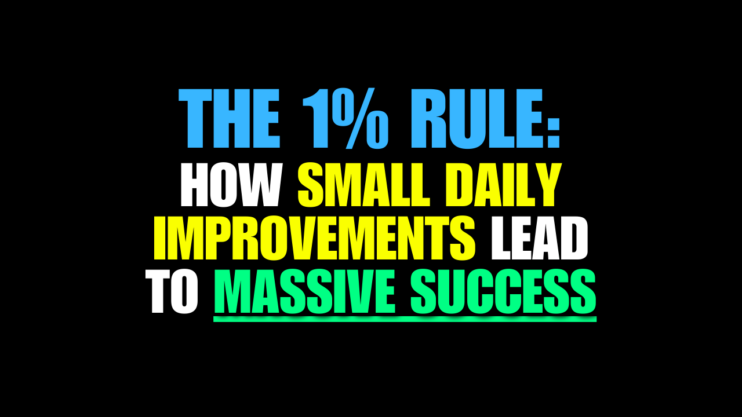In the hustle and bustle of modern life, we often seek rapid transformations—quick fixes that promise immediate results. Yet, true and lasting change seldom occurs overnight. Instead, it’s the compounding effect of small, consistent actions that leads to profound transformation. This principle, often referred to as the 1% Rule, suggests that by improving just 1% each day, we can achieve remarkable growth over time.
Understanding the 1% Rule
The essence of the 1% Rule lies in the power of compounding. While a single day’s 1% improvement might seem negligible, its cumulative impact over an extended period is substantial. Mathematically, improving by 1% daily leads to being approximately 37 times better after a year. This exponential growth underscores how minor, consistent enhancements can lead to significant advancements.
Positive Psychology and Incremental Improvements
Positive psychology emphasizes the cultivation of strengths and virtues to enhance well-being. It aligns seamlessly with the 1% Rule, advocating for small, daily practices that foster a positive mindset and overall happiness. Research supports this approach:
- Gratitude Journaling: Regularly noting things we’re grateful for can increase happiness and reduce depression. Participants who maintained weekly gratitude journals reported greater optimism and exercised more, compared to those who didn’t (Emmons & McCullough, 2003).
- Savoring Positive Experiences: Engaging in activities that promote savoring, such as taking a daily 20-minute walk while noticing positive elements, has been linked to increased happiness levels (Bryant & Veroff, 2007).
- Self-Compassion Exercises: Practices that foster self-kindness and mindfulness have been shown to boost self-efficacy and reduce rumination, contributing to overall well-being (Neff, 2011).
Practical Applications of the 1% Rule
Embracing the 1% Rule involves integrating small, manageable changes into daily routines. Here are some practical applications:
- Physical Health: Incorporate a short walk or a brief exercise session into your day. Over time, these modest efforts can lead to substantial health benefits.
- Mental Well-being: Dedicate a few minutes each day to mindfulness or meditation practices. These moments of reflection can accumulate, enhancing mental clarity and reducing stress.
- Skill Development: Allocate time daily to learn something new, such as reading a few pages of a book or practicing a new language. Consistent learning fosters personal growth and adaptability.
Real-Life Implications
The 1% Rule isn’t merely a theoretical concept; it has practical implications across various domains:
- Personal Growth: Individuals who commit to small daily improvements often experience enhanced self-confidence and a sense of accomplishment.
- Professional Development: In the workplace, teams that focus on continuous, incremental improvements tend to be more innovative and efficient.
- Relationships: Consistently investing in small acts of kindness and communication can strengthen personal relationships over time.
Conclusion
The journey to significant change doesn’t require monumental efforts overnight. By embracing the 1% Rule and focusing on consistent, small improvements, we harness the power of compounding to achieve remarkable transformations. This approach, rooted in principles of positive psychology, empowers us to cultivate a fulfilling and resilient life.
Call to Action
Let’s commit to the 1% Rule. Identify one small change you can implement today, and witness how these daily enhancements lead to substantial growth. Remember, it’s the consistent, incremental steps that pave the way for profound transformation.
Citations
- Emmons, R. A., & McCullough, M. E. (2003). “Counting blessings versus burdens: An experimental investigation of gratitude and subjective well-being in daily life.” Journal of Personality and Social Psychology, 84(2), 377-389. Link
- Bryant, F. B., & Veroff, J. (2007). Savoring: A New Model of Positive Experience. Psychology Press. Link
- Neff, K. D. (2011). “Self-compassion, self-esteem, and well-being.” Social and Personality Psychology Compass, 5(1), 1-12. Link




